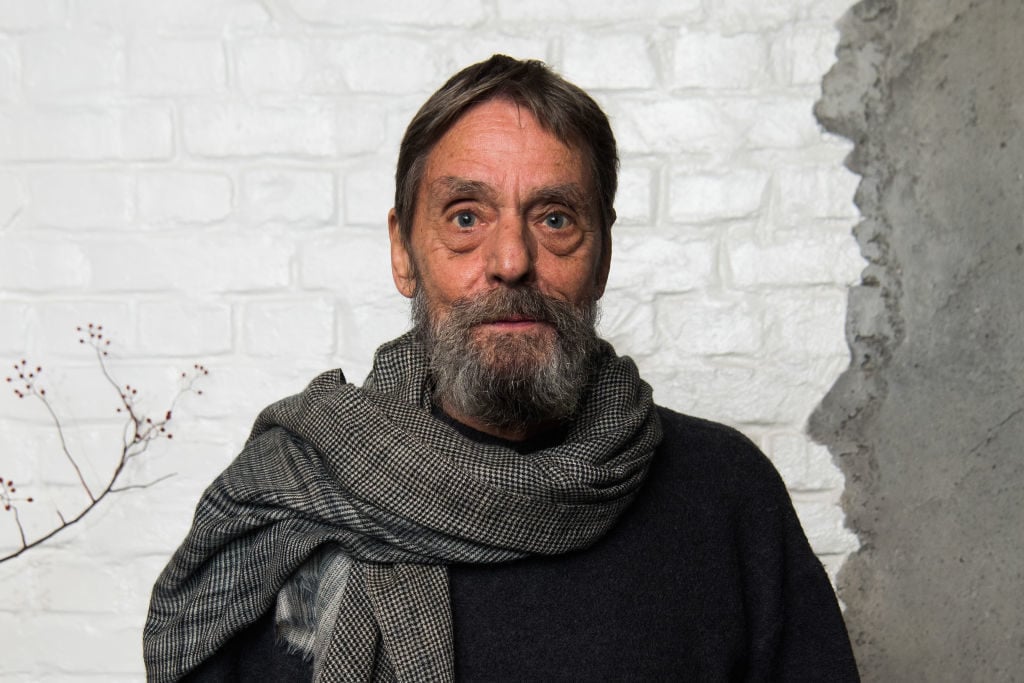People
Ulay, the Performance Art Pioneer and Fabled Former Partner of Marina Abramović, Has Died at Age 76
"He was an exceptional artist and human being," Abramovic recalls of her former partner.

"He was an exceptional artist and human being," Abramovic recalls of her former partner.

Kate Brown

The artist Frank Uwe Laysiepen, better known as Ulay, has died at age 76 in his adopted home of Lljubljana, Slovenia.
Ulay was a pioneer in performance art, photography, and body art, who rose to fame during a long collaboration with his ex-art partner and girlfriend Marina Abramović.
Ulay died on Monday at the University Rehabilitation Institute in Ljubljana, leaving behind a foundation in Amsterdam and a recently launched project space in Slovenia. The cause of death has not been confirmed, though the artist had been in recovery from lymphatic cancer.
“It takes a long time, perhaps a lifetime, to understand Ulay,” Abramović once said about about the artist with whom she shared one of the most famous artistic relationships. After meeting in 1976, the two embarked on a series of challenging and sometimes physically extreme performances called “Relations Works.” The themes often had to do with the boundaries between self and other, and variously involved Ulay and Abramović screaming in each others’ faces, braiding their hair together, and sitting still and staring at each other for as long as they could bear.
In one final, particularly symbolic work, the couple walked from either side of the Great Wall of China in 1988 and met in the middle to say goodbye and part ways for good.
“It is with great sadness l learned about my friend and former partner Ulay’s death today,” Abramović tells Artnet News. “He was an exceptional artist and human being, who will be deeply missed by all those who knew him. On a day like this, it is comforting to know that his art and legacy will live on for a long time to come.”
Ulay was born in a wartime bunker in the German town of Solingen in 1943. His father died when Ulay was only 14. A few years later, in 1969, Ulay packed up and left Germany, later explaining that he was disturbed by “Germanness” and repelled by the German bourgeois lifestyle. He planted roots in Amsterdam, where he maintained a home until his death. Later, when he met his partner, he began to split his time between Amsterdam and the Slovenian capital of Ljubljana.
“He will be deeply missed by his family, friends, the art community, and the thousands of us, who he has so deeply touched and inspired,” the ULAY Foundation writes on social media. “He influenced generations of artists and many more to come—his memory and legacy will live on forever through his work and the work of the ULAY Foundation.”
As a young artist, Ulay was a pioneer in instant photography and self-portraiture. From 1970, he worked as a consultant to Polaroid, which gave him unlimited access to cameras, film, and other materials. During the subsequent five years, he explored questions of identity through intimate and up-close images of himself, as well as of transvestities and transsexuals.
Ulay and Abramović made a memorable reunion in 2011 during Abramović’s performance at the Museum of Modern Art in New York. Abramović had been performing her seated work The Artist is Present, awaiting visitor after visitor to sit across from her and look into her eyes. At one point, she looked up and found Ulay looking back at her. The moment, captured on video, has been watched 17.3 million times on YouTube.
That sentimental feeling was soon shattered, however, when Ulay brought a lawsuit against his former partner in 2015, claiming she had violated a contract regarding their collaborative works. In conclusion, a Dutch court ordered Abramović to pay Ulay royalties totaling €250,000 ($280,500). Years later, in an interview timed to Abramović’s opening at the Louisiana Museum, the former couple said they had resolved their differences and that their relationship was again peaceable.
“Ulay was incomparable. The most influential and generous artist I have ever known, the most gentle, selfless, ethical, elegant, witty, the most incredible human,” wrote Ulay’s gallerist in New York, Mitra Korasheh, on Instagram. “He will be deeply missed by his family, friends, the art community and the thousands of artists he inspired, but his memory and legacy will live on.”
The filmmaker Christian Lund remembers Ulay as a “beautiful soul,” and a friend, who even when weakened by cancer had a powerful presence on camera. In 2017, he interviewed the artist for the Louisiana Museum of Modern Art near Copenhagen. Lund is editing footage of interviews he did with Ulay and Abramović for a forthcoming film with Louisiana Channel. The performance artists’ final collaboration has a new urgency and poignancy. “We look forward to sharing the truly unique recordings where both artists gave all they had in the confrontation with each other and the cameras,” Lund says.